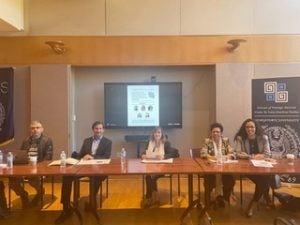During the Convening on the Political Economy of Climate Change on October 16, panelists and discussants presented a series of perspectives on climate change and the serious governance and developmental challenges it poses to states, economies, and societies in the Latin American and Caribbean region.
First, Dr. Liliana Duica Amaya presented on the importance of the Amazon rainforest in regulating the global climate, drivers of deforestation, and challenges to sustainable development in the Amazon. She highlighted production chains and cattle ranging as particular factors that often drive environmental degradation and discussed the intersection of these economic factors with coca production, drug trafficking, and decentralized governance in Latin America. Furthermore, she discussed the detrimental effects of mercury mining on the environment.
Next, Dr. Camille Gaskin-Reyes discussed water management challenges in the Andean region, focusing on the intersection of agriculture, climate change, and vulnerable populations. She identified particular strategic and operational issues and their outcomes, as well as a set of policy recommendations that broadly include more sustainable policy and implementation, engaging stakeholders, and building capacity.
Finally, Dr. Patricia Biermayr-Jenzano presented on food systems, climate change, and the disproportionate effect of malnutrition on women. She discussed the “Triple Burden” of undernutrition, overnutrition, and micronutrient deficiency in Latin America and the Caribbean and how the United Nations’ 5 Action Tracks provide a framework for eliminating these issues.
Next, Professor Alejandro Camargo provided commentary on the panelists’ presentations and topics. He highlighted the nexus of health and climate, such as mercury pollution, malnutrition, and the increasing prevalence of mosquito-borne diseases, as current water storage practices are ill-equipped to handle the cascading effects of climate change. He also recommended that climate change mitigation policies take lessons from the First Agricultural Revolution to increase levels of sustainable development. Finally, Dr. Diego Arias shared a reflection on the connection between food insecurity, agricultural practices, and climate change and recommended restructuring climate financing to better mitigate these issues.
